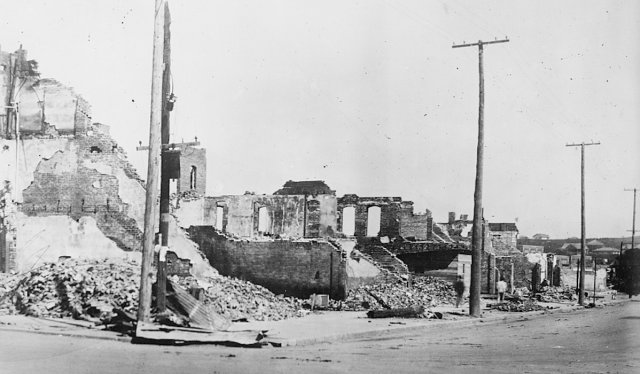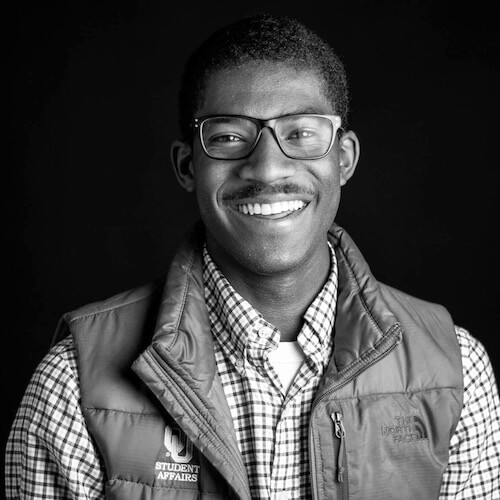
The old saying goes, “Violence is not the answer.” I wholeheartedly agree. When we want resolution and peace, violence isn’t the answer.
However, history has shown repeatedly that violence often is the chosen answer of those seeking to gain power and dominance over others.
We see this idea play out in our everyday lives — from America’s involvement in numerous wars to sports based on physically dominating the opposition. Power is established by forcing the other side to concede in order to avoid further harm, pain or even death.
This month, Oklahoma will mark the centennial anniversary of the Tulsa Race Massacre, which killed and injured countless Black residents while obliterating hundreds of homes and businesses.
This tragedy, perhaps the worst instance of racial violence in our country’s history outside of 246 years of chattel slavery, was spurred by false rumors spread by a white-owned media outlet, the Tulsa Tribune, and pushed by community members and law enforcement officers. The physical and psychological impact of the violence is still felt by the victims and their families, and by the community at large, a century later. My heart goes out to the Tulsa and Greenwood community as they continue to work toward communal healing and justice for the survivors and descendants of victims.
This anniversary should serve as a reminder not only of the devastating impact of racial violence but also of why it is important to examine and understand the social power structures that enable and perpetuate violence.
We must understand racism in order to dismantle it
As University of Oklahoma professor and Tulsa Race Massacre Commission member Dr. Karlos Hill has noted, despite the gains of rights and wealth for Black Americans, violence has been a persistent tool of oppression against them since 1619, when the first slave ships landed in North America.
Pulitzer-Prize winning author Isabel Wilkerson writes in her book Caste that, “The only way to keep an entire group of sentient beings in an artificial fixed place, beneath all others and beneath their own talents, is with violence and terror, psychological and physical, to preempt resistance before it can be imagined.”
This pattern of violence can be seen in the caste systems of India, in Nazi Germany, and in the American history of chattel enslavement and Jim Crow. We see it now in the disproportionate incarceration of people of color and the disproportionate use of the death penalty against felony-convicted Black people. (Earlier this month, the governor of South Carolina, where executions were long halted because of issues with lethal-injection drugs, signed a bill aimed at resuming executions and which forces death-row inmates to choose between a firing squad or electric chair. Of the 37 inmates on the state’s death row, 19 are Black.) And, lest we forget, this violence can also been seen in the American internment of Japanese people in the 1940s, as well as today in the Israeli State’s ongoing occupation of the Palestinians.
White supremacy and its accompanying violence are partly maintained by the idea that white, straight, Christian men are predisposed to lead government, society, business and the home. When women, queer folks, people of color, and non-Christians show up in these spaces, empowered, it poses a threat to structural white supremacy, which is alive and well in the United States and globally.
It is not to be dismissed that the compliance of the very victims of these systems is key to allowing the continuation of the status quo. And Wilkerson notes how the psychological degradation of those being oppressed allows for the perpetuation of such systems.
This process includes, in my opinion, misinformation about and erasure of the history of the systems. This is why the eradication of teaching about racial violence and racism in our schools is an enormous issue.
As Dr. Periloux C. Peay, of Georgia State University, pointed out in a tweet recently, the growing movement to ban Critical Race Theory is an example of the very structural racism Critical Race Theory is meant to examine. If people do not understand the systems that enshrine racism, they will not be equipped to eradicate them. If those systems are not eradicated, then those who benefit from the systems will continue to reign.
We can’t ignore hard truths
Violence engenders fear, and miseducation engenders ignorance. Fear and ignorance disempower all people, privileged and underprivileged alike, from creating change in the world around us and dismantling the caste systems in which our global society operates.
Fear of the unknown is what will keep us from a just society. It is what will bar us from the “Beloved Community” imagined by Dr. Martin Luther King, Jr. The core value of this quest is agape love. Violence won’t lead us there.
If violence has been the chosen answer to maintain these systems, we must choose truth as the pathway toward justice and equity as the tool to build harmony.
It’s a daily battle we see in the politics of our nation, through debates over voter rights, states’ rights, equality and the protection of life and liberty. The question remains, “What are we willing to sacrifice to achieve this?” My hope is that we lay down our arms and sacrifice the use of violence to preserve human life and dignity and achieve true justice.
Just as in our own lives and personal stories, there is truth about our country that brings pride and some that brings shame. Yet it is in how we respond to these truths that reveals our character.
America has been given numerous chances to show ourselves and the world who we are. We must remain up for the challenge of showing that we are greater than our roots, that we are united and that all are created equal. We must face the truth to set ourselves free.






















